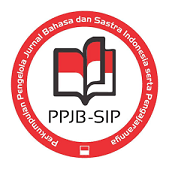PEMBELAJARAN MENGEMBANGKAN KARANGAN NARASI BERDASARKAN TEKS WAWANCARA PADA SISWA KELAS VIIA4 DI SMP NEGERI 3 SAWAN
DOI:
https://doi.org/10.23887/jjpbs.v3i1.6258Abstract
Ini bertujuan mendeskripsikan (1) perencanaan pembelajaran mengembangkan karangan narasi berdasarkan teks wawancara pada siswa kelas VIIA4 di SMP N 3 Sawan, (2) pelaksanaan pembelajaran mengembangkan karangan narasi berdasarkan teks wawancara pada siswa kelas VIIA4 di SMP N 3 Sawan, dan (3) evaluasi pembelajaran mengembangkan karangan narasi berdasarkan teks wawancara pada siswa kelas VIIA4 di SMP N 3 Sawan. Subjek penelitian ini adalah guru pengampu mata pelajaran Bahasa Indonesia dan siswa kelas VIIA4 SMP Negeri 3 Sawan. Metode pengumpulan data yang digunakan adalah metode dokumentasi dan observasi. Data dianalisis menggunakan teknik deskriptif kualitatif. Hasil penelitian ini menunjukkan bahwa guru telah melakukan tiga tahapan dalam pembelajaran. Ketiga tahapan tersebut meliputi perencanaan pembelajaran, pelaksanaan pembelajaran, dan evaluasi pembelajaran. Pada perencanaan pembelajaran, guru membuat rencana pelaksanaan pembelajaran (RPP) lengkap berdasarkan komponen-komponen RPP pada kurikulum KTSP. Pada pelaksanaan pembelajaran terdapat dua aktivitas, yaitu aktivitas guru dan aktivitas siswa. Aktivitas yang dilakukan oleh guru meliputi tiga kegiatan kegiatan pembelajaran, yaitu kegiatan awal, kegiatan inti (eksplorasi, elaborasi, konfirmasi), kegiatan penutup. Evaluasi pembelajaran mengembangkan karangan narasi berdasarkan teks wawancara pada siswa kelas VIIA4 di SMP N 3 Sawan dilakukan dengan tes tertulis yang disesuaikan dengan instrumen yang terdapat dalam RPP.Kata Kunci : Kata kunci: pembelajaran, pengembangan teks wawancara menjadi karangan narasi
This research aims to describes (1) learning plan to development a narrative essay based on interview text students of grade VIIA4 in SMP N 3 Sawan, (2) implementation of learning develop a narrative essay based on interview text on students of grade VIIA4 in SMP N 3 Sawan, (3) Evaluation of learning to development a narrative essay based on interview text on students of grade VIIA4 in SMP N 3 Sawan. Subject of this research is Indonesia teacher and students of VIIA4 in SMP N 3 Sawan. Data collection method used is documentation method and observation method. Data is analyzed using qualitative descriptive technique. These results indicate that the teacher has conducted three phases of learning the third phase includes the planning of learning, implementation of learning, and evaluation of learning. On planning of learning, the teacher makes planning of learning completely based on components of RPP to the curriculum KTSP. On the implementation of learning there are two activities, it is teacher activities and students activities. The activities did by teacher involve three of learning activities, it is first activities, main activities (exploration, elaboration, and confirmation), last activities, (3) the evaluation of learning to development narrative essay depend on interview text on students of grade VIIA4 in SMP N 3 Sawan did by writing test adapted with insreuments on the RPP.
keyword : Keywords: learning, the development of the interview text into a narrative essay
Published
2015-11-06
Issue
Section
Articles
License
Authors who publish with the Jurnal Pendidikan Bahasa dan Sastra Indonesia Undiksha agree to the following terms:- Authors retain copyright and grant the journal the right of first publication with the work simultaneously licensed under a Creative Commons Attribution License (CC BY-SA 4.0) that allows others to share the work with an acknowledgment of the work's authorship and initial publication in this journal
- Authors are able to enter into separate, additional contractual arrangements for the non-exclusive distribution of the journal's published version of the work (e.g., post it to an institutional repository or publish it in a book), with an acknowledgment of its initial publication in this journal.
- Authors are permitted and encouraged to post their work online (e.g., in institutional repositories or on their website) prior to and during the submission process, as it can lead to productive exchanges, as well as earlier and greater citation of published work. (See The Effect of Open Access)







